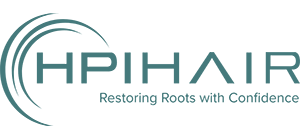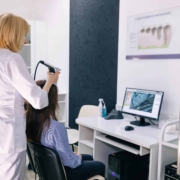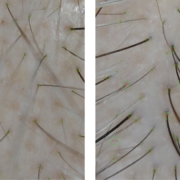Revolutionizing Hair Regrowth: The Power of Peptide Therapy
Drawbacks Of Peptide Therapies
At HPIHair in Nashville, we offer personalized, physician-supported solutions rooted in science to help you address the underlying causes of hair loss. Our team of trichologists and hair loss specialists work with you to develop a clinically-based, individualized treatment plan tailored to your unique needs, whether you’re in the early stages of hair loss or seeking full restoration. With over 30 years of success in helping people regrow their hair, it’s no wonder that physicians trust us with their patients’ care. One promising option we offer is peptide therapy, a rapidly developing field that uses specific peptidesshort chains of amino acidsto potentially influence biological processes like tissue repair, immune function, and overall wellness. Though peptide therapy shows promise in supporting hair regrowth, individual results can vary, so it’s essential to consult with healthcare professionals to determine how this treatment may align with your personal health goals. Experience the power of hair science for yourselfget started on your journey today.
Exploring Peptide Therapy for Hair Regrowth
Peptide therapy has garnered considerable attention as a potential solution for hair regrowth, particularly for women experiencing hair loss. Understanding the benefits and drawbacks of this emerging treatment can help individuals make informed decisions about their hair restoration journey. Consider the following pros and cons associated with peptide therapy:
Pros of Peptide Therapy
– Stimulates Hair Follicles: Peptide therapy can target the hair follicles to promote growth and aid in the restoration of healthy, robust hair.
– Addresses Underlying Causes: Unlike some traditional treatment options, peptide therapy focuses on addressing the root causes of hair loss, potentially yielding long-term improvements.
– Minimal Side Effects: Many patients report minimal to no adverse effects from peptide therapy, making it a potentially favorable option for those seeking hair restoration with minimal disruptions to their daily lives.
– Tailored Treatment: Peptide therapy can be personalized to address individual needs, offering a customized approach to hair regrowth that aligns with each patient’s unique circumstances and goals.
– Non-Invasive Option: This treatment modality typically does not involve invasive procedures, providing a non-surgical alternative for individuals seeking to avoid more extensive interventions.
Cons of Peptide Therapy
– Variable Results: While peptide therapy holds promise for many, individual responses to the treatment may vary, leading to unpredictable outcomes for some individuals.
– Treatment Duration: Achieving noticeable results with peptide therapy may require consistent, ongoing treatment over an extended period, necessitating commitment and patience from patients.
– Cost Considerations: Peptide therapy may involve financial investments for regular treatments, potentially posing a barrier for some individuals seeking hair restoration solutions.
– Limited Research: Although initial findings are promising, the field of peptide therapy for hair regrowth is still evolving, with ongoing research needed to fully understand its long-term effectiveness and potential benefits.
– Individual Suitability: Peptide therapy may not be suitable for everyone, and discerning whether it aligns with a patient’s specific health needs requires thorough consultation with healthcare professionals.
Navigating Your Hair Restoration Journey
When considering peptide therapy for hair regrowth, it’s crucial to weigh the potential advantages and limitations of this approach. Consulting with our experienced team of trichologists and hair loss specialists at HPIHair in Nashville can provide valuable insights into how peptide therapy may align with your unique circumstances. By harnessing the science and expertise behind peptide therapy, you can embark on a hair restoration journey tailored to your individual needs and aspirations.
Schedule a Session Today to Explore Peptide Therapy for Hair Regrowth














